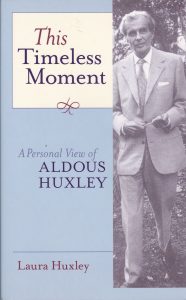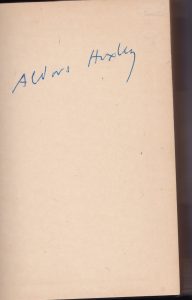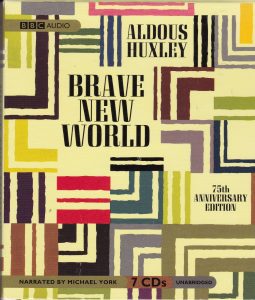(from another book from his personal library)
Huxley (1894-1963) was a notable intellectual, mystic, witty novelist, and consciousness expert and the author of Brave New World. He was long involved with Eastern philosophies and, notably, the human potential movement.
-All that happens means something; nothing you do is ever insignificant.
-It is necessary for us to be open to and conscious of information from all systems, sources, and worlds.
-It is necessary to balance reason with immediate experience.
-Life is short and information endless: nobody has time for everything.
-My mind is so busy thinking about values that I don’t have time to experience them.
-Everybody strains after happiness, and the result is that nobody’s happy.
-Happiness is like coke–something you get as a by-product in the process of making something else.
-Never put off the fun you can have today.
-We are all geniuses up to the age of ten.
-Children are remarkable for their intelligence and ardor, for their curiosity, for their intolerance of shams, the clarity and ruthlessness of their vision.
-The secret of genius to carry the spirit of the child into old age, which means never losing your enthusiasm.
-Societies are composed of individuals and are good insofar as they help individuals to realize their potentialities and to lead a happy and creative life.
-Technological progress has merely provided us with more efficient means for going backwards.
-A love of nature keeps no factories busy.
-My father considered a walk among the mountains the equivalent of churchgoing.
-We shall be permitted to live on this planet only for as long as we treat all nature with compassion and intelligence.
-The proper study of mankind is books.
-The writer proposes, the readers dispose.
-Every man’s memory is his private literature.
-Everyone who knows how to read has it in their power to magnify themselves, to multiply the way in which they exist, to make their life full, significant, and interesting.
-The creation by word power of something out of nothing–What is it but magic? And what may I add, what is that but literature?
-Words can be like X-rays if you use them properly–they’ll go through anything. You read and you’re pierced.
-Words form the thread on which we string our experiences.
-Words are man’s first and most grandiose invention. With language he created a whole new universe.
-Much of one’s life is a prolonged effort to avoid thinking.
-…man’s almost infinite appetite for distractions.
-The more powerful and original a mind, the more it will incline toward the region of solitude.
-If one’s different, one’s bound to be lonely.
-Facts do not cease to exist because they are ignored.
-An unexciting truth may be eclipsed by a thrilling falsehood.
-The deepest sin against the human mind is to believe things without evidence.
-The vast majority of human beings are not interested in reason or satisfied with what it teaches.
-However expressive, symbols can never be the things they stand for.
-You shall know the truth and the truth shall make you mad.
-One believes things because one has been conditioned to believe them.
-Most human beings have an almost infinite capacity for taking things for granted.
-That men do not learn very much from the lessons of history is the most important of all the lessons that history has to teach.
-It isn’t a matter of forgetting. What one has to learn is how to remember and yet be free of the past.
-Real progress is progress in charity, all other advances being secondary thereto.
-Cruelty and compassion come with the chromosomes.
-Maybe this planet is another planet’s hell.
-Freedom to be a round peg in a square hole.
-The most nearly free men have always been those who combined virtue with insight.
-At their first appearances, innovators have always been described as fools and madmen.
-I wanted to change the world. But I have found that the only thing one can be sure of changing is oneself.
-There is only one corner of the universe you can be certain of improving and that’s your own self.
-The more a man knows about himself in relation to every kind of experience, the greater his chance of suddenly, one fine morning, realizing, who in fact he is.
-Contemplation and consciousness go together. Our consciousness can be liberated by breaking the back of ego. Our most memorable experiences are ones felt/experienced upsurges of consciousness.
-Consciousness is only possible through change; change is only possible through movement.
-We don’t want to change. Every change is a menace to stability.
-If most of us remain ignorant of ourselves, it is because self-knowledge is painful and we prefer the pleasures of illusion.
-For in spite of language, in spite of intelligence and intuition and sympathy, one can never really communicate anything to anybody.
-We live together, take action, we react to one another; but always , and in all circumstances, we are by ourselves.
-You know nothing of my inner world, and yet you presume to judge that world.
-Love is a mode of knowledge.
-One touches and, in the act of touching, one’s touched.
-After silence, that which comes nearest to expressing the inexpressible is music.
-Perhaps it is good for one to suffer. Can an artist do anything if he is happy? Would he ever want to do anything? What is art, after all, but a protest against the horrible inclemency of life?
-People believe in God because they’ve been conditioned to believe in God.
-It is natural to believe in God when you’re alone–quite alone, in the night, thinking about death.
-The only truly consistent are the dead.
-There was a thing called the soul and a thing called immortality.
-It is a bit embarrassing, to have been concerned with the human problem all one’s life and find at the end that one has no more to offer by way of advice than ‘Try to be a little kinder’.
-To his dog, every man is Napoleon; hence, the constant popularity of dogs.



